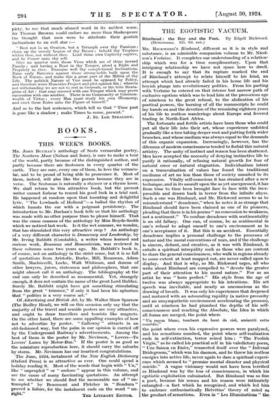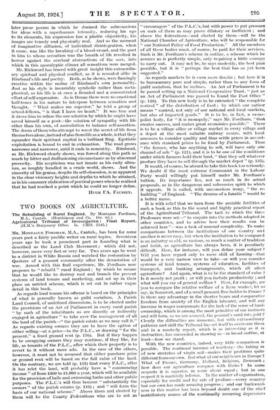THE EGOTISTIC VACUUM.
Mn. RICRWORD'S Rimbaud, different as it is in style and substance, is an admirable companion volume to Mr. Nicol. son's Verlaine. It completes our understanding of a relation- ship which was for a time complimentary. Upon that intriguing relationship we have not space here to dwell. It is enough to say that its rupture marked the end of Rimbaud's attempt to relate himself to his kind, an attempt which had already failed in his home life and his boyish plunge into revolutionary politics. From his parting with Verlaine he entered on that intense but narrow path of exclusive egotism which was to lead him at the precocious age of nineteen to the great refusal, to the abdication of his poetical powers, the burning of all the manuscripts he could lay hands on and the devotion of the remaining eighteen years of his life to restless wanderings about Europe and fevered trading in North-East Africa.
The fortunate and fertile artists have been those who could put all their life into their art, whose experience unfolded gradually like a tree taking deeper root and putting forth wider branches, and whose medium was always equal to the demands of this organic expansion. Increasingly, however, has the dilemma of modern consciousness tended to forbid this natural artistry. The unity of instinct and reason has been shattered. Men have accepted the necessity of denying instinctive life to purify it rationally, of refusing natural growth for fear of natural error or natural stagnation. Individualism intent on a transvaluation of values has found the traditional mediums of art no less than those of society unsuited to its expression. Vitally self-conscious it has strained after a new technique, and in its assault upon the as yet unexpressed, it has from time to time been brought face to face with the inex- pressible and drawn back in terror from the infinite abyss. Such a one was Rimbaud, and Mr. Rickword seems to us to misunderstand "decadence," when he notes it as strange that Rimbaud should have been claimed as one of its pioneers, pleading that there is in his poems" no concession to weakness, not a sentiment." To confuse decadence with sentimentality is an old fallacy. One can, of course, be as sentimental in one's refusal to adapt oneself to one's environment as in one's acceptance of it. But this is an accident. Essentially decadence implies a personal challenge to the processes of nature and the moral conventions of man, and if the challenge is sincere, defiant, and creative, as it was with Rimbaud, it entails a spiritual intrepidity such as those who arc content to share the general consciousness, who walk in regions already to some extent at least mapped out, are never called upon to display. And that is why, as Mr. Rickword urges, all who write about Rimbaud are compelled to "devote the greater part of their attention to his moral nature." For as an artist he was "born perfect." His style from the age of twelve was always appropriate to his intentions. His art speech was inevitable, and nearly as unconscious as the drawing of breath. It was only his experiences that deepened and matured with an astounding rapidity (a native precocity and an unsympathetic environment accelerating the process), until at nineteen he had plumbed the depths of his self- consciousness and reaching the Absolute, the Idea in which all forms are merged, the point where
"Un rayon blane, tombant du haut de del, aneantit cette comedic," the point where even his expressive powers were paralyzed, and his sensations numbed, the point where self-realization ends in self-extinction, terror seized him ; "The Foolish Virgin," as he called his practical self in his valedictory poem, " Une Saison en Enfer," reasserted itself over the "Infernal Bridegroom," which was his daemon, and he threw his restless energies into active life, never again to dare a spiritual experi- ence which seemed to "promise mental disaster and physical suicide." A vague visionary would not have been terrified as Rimbaud was by the loss of consciousness, in which his egotistic exploitation culminated. But Rimbaud was so fine a poet, because his senses and his reason were intimately entangled—a fact which he recognized, and which led him to embrace enthusiastically Helvetitts' theory of mind as the product of sensations. Even in "Les Illuminations" the later prose poems in which he drained, the subconscious for ideas with a superhuman intensity, reducing his ego to its elements, his expression ha.s a plastic objectivity, his images are tensely and physically real. And so the moment of imaginative diffusion, of individual disintegration, when it came, was like the breaking of a blood-vessel, and the poet in him to whom sensation -was the breath of life revolted in horror against the cerebral abstractions of the seer, into which in this apocalyptic climax all sensations were merged.
Mr. Rickword has traced with great insight this extraordin- ary spiritual and physical conflict, as it is revealed alike in Rimbaud's life and poetry. Both, as he shows, were flamingly creative within the radius of Rimbaud's own personality. Just as his style is invariably symbolic rather than meta- phorical, so his life is at once a frenzied and a concentrated effort of self-expression. As in Donne there were no emotional half-tones in his nature to interpose between sensation and thought. "What makes me superior," he told a group of school-fellows, "is that I have no heart." It was true and it drove him to refuse the one solution by which he might have saved himself as a -poet—the solution of sympathy with life other than his own, of assimilation to balance self-assertion. The doom of those who attempt to wrest the secret of life from themselves alone, instead of also from life as a whole, is that they squander their spiritual capital in a brilliant fling. Egotistic exploitation is bound to end in exhaustion. The road grows narrower and narrower, until it ends in nonentity. Rimbaud, as Mr. Rickword clearly shows, was forced along this path as much by bitter and disillusioning circumstance as by abnormal precocity. His scepticism was not innate as his early altru- ism, so roughly handled in a crude world, shows. And the sincerity of his genius, despite its self-obsession, is as apparent in the clear visionary heights and depths to which he attained, as in his summary abdication of poetical power when he realised that he had reached a point which he could no longer define.
}luau I'A. FAUSSET.



































 Previous page
Previous page